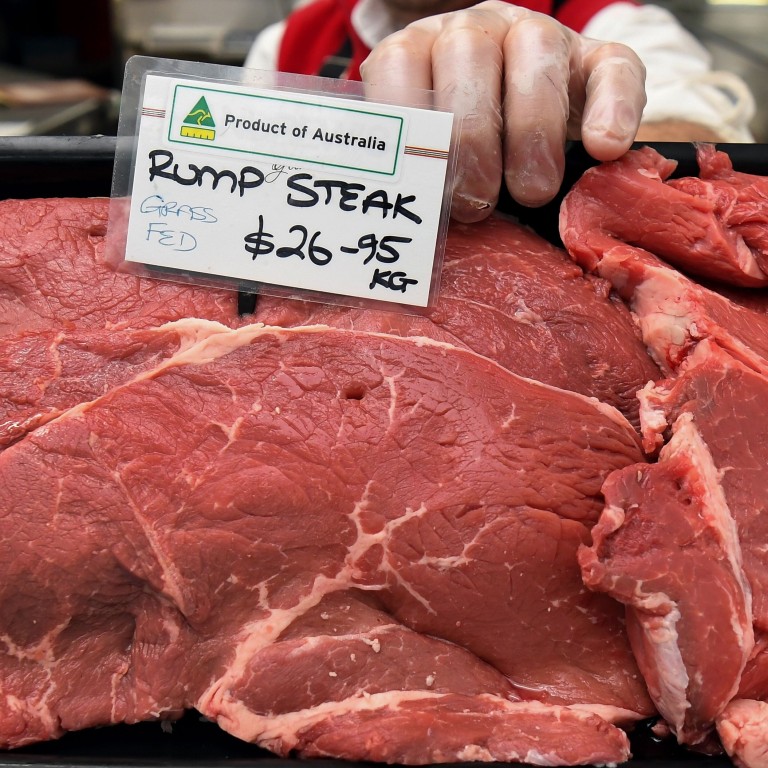
Exclusive | China-Australia relations: 9,000 litres of beer, 8,000kg of beef stopped at Chinese ports as trade spat continues
- Manufacturer and distributor Sydney Beer Co. had its shipment halted at the southeastern Chinese port city of Xiamen last month due to incorrect labelling
- Meramist, the Queensland abattoir suspended by Chinese customs two weeks ago, was stopped at Nanjing port over mismatched certifications
Nearly 9,000 litres of Australian craft beer was stopped from entering one Chinese port last month, while another 8,000kg of frozen beef from a suspended abattoir was detained in Shanghai, the latest Chinese customs data showed.
The 8,794kg of craft beer exported by manufacturer and distributor Sydney Beer Co. was held at the southeastern Chinese port city of Xiamen in November due to incorrect labelling, although there are no indications the company itself has been banned.
In the same month, a third Australia exporter, Queensland’s Australian Country Choice, had a 20kg batch of frozen beef detained in Shanghai over mismatched certification. There were also no indications that specific trade actions were being made against Country Choice.
Sydney Beer Co. and Country Choice did not respond to requests for comment, while Meramist said it has always cooperated with the authorities and would continue to do so.
China is now seen to be less likely to overlook Australia’s shipment errors – which is common given the large amounts of exports – and have moved quickly to penalise mistakes.
The first four Australian meat processing plants banned from exporting to China – Kilcoy Pastoral, JBS Beef City, JBS Dinmore and Northern Cooperative Meat Company – had repeated compliance issues over mislabelling and mismatched health and goods certificates last year and early this year before they were suspended in May.
The Australian Lamb Company, in Colac, Victoria, which has not been able to resume its trade with China after closing down its operations due to on-site coronavirus infections in July, also had mismatched certification over a small batch of frozen bone-in lamb meat in June.
Simon Quilty, Australian agricultural expert and managing director of MLX, a company which specialises in risk management and brokering beef swaps, said political tensions have made exporters more vulnerable especially with China moving faster to penalise mistakes.
Once upon a time, China was willing to show more tolerance and help resolve these issues together. Today, there is little left in China’s ‘goodwill bank’ towards Australia
“China’s tolerance today, compared to two years ago for Australia, is low for any irregularities in export compliance, whether it is labelling or any other specification issue,” said Quilty.
“Once upon a time, China was willing to show more tolerance and help resolve these issues together. Today, there is little left in China’s ‘goodwill bank’ towards Australia.”
Quilty, though, is hopeful that new Australian trade minister Dan Tehan – who took over from Simon Birmingham on Tuesday – will be able to rebuild credibility in the relationship.
Other Australian exporters, including seafood as well as vitamin and supplements, have also had compliance issues throughout the year although they were not subjected to suspensions.
In August and September, Chinese customs found certification problems and excessive food additives in Sydney pharmaceutical manufacturer Ferngrove Pharmaceuticals’ shipments of supplements to Shanghai, Nanjing and Huangpu.
In September, more than 25,000kg of frozen fish from Austral Fisheries was stopped in Qingdao due to insufficient certification.
Chinese customs also found traces of animal disease in 486kg of manuka honey from exporter IAW in Guangzhou in July.
The three firms did not respond to requests for comment.
Australia is not the only country encountering problems with Chinese customs. Each month, many countries including New Zealand, the United States, India, as well as Southeast Asian nations, regularly commit breaches of Chinese import regulations.
But China and Australia are locked in political conflict that has implications on Australia’s heavy exports to China. The two countries have a nearly A$240 billion (US$181 billion) two-way trade relationship, based on this year’s data.

